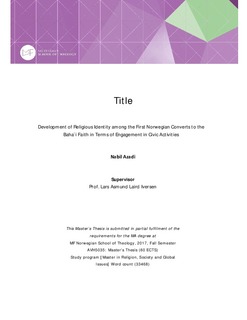Development of Religious Identity among the First Norwegian Converts to the Baha`i Faith in Terms of Engagement in Civic Activities
Abstract
This thesis presents an empirical study of how ethnic Norwegian converts to the Baha`i Faith put their Baha`i identities into practice while engaging in civic activities within the local Baha`i community and the society at large. It demonstrates how being, doing, and knowing aspects of the informants` religious identities undergo changes while they involve in activities. It also discusses how the components of the religious identity influence each other. The approach of the thesis is a qualitative one making use of in-depth interviews and mixed questionnaires, which include both definitive and open-ended questions. I employ the snowball sampling technique. The number of respondents totals ten, comprising eight women and two men. I have adopted content analysis as the method to interpret data. In order to carry out the research, I have used a socio-psychological approach. Marcia`s psychological study, on the one hand, assists me in dividing religious identity into two general aspects of commitment and exploration. Warburg`s (2006) theory on religious identity, on the other hand, helps me to divide each aspects of commitment and exploration into three parts namely; being, doing and knowing. This provides me with a basis for analyzing data.
Depending on what role religion plays in the lives of the interviewees, the translation of religious identity into practice take different forms. This is because religion determines what civic activities the informants are allowed to involve in and what activities they are proscribed to do. In this process, being, doing, and knowing aspects of a religious identity affect each other reciprocally and are affected by social conditions. Activities that the informants are engaged in can have strengthening or weakening effects on identity.
In this study, informants are divided into three groups. The first grouping consists of those who call themselves devoted Baha`is. The second group includes those who feel their Baha`i identities are imperfect, and thirdly are those who assume that religion is merely a part of their private and social lives. The members of the first and the third groups, compared to the second group, show more tendency to be involved in more formal activities. The second group has less inclined to become involved in politics in comparison the other two. The third group have negatively been affected by Baha`i activities compared to other. However, there is a similarity between the three groupings. Being aspect of the religious commitment plays a more important role in incentivizing majority of the informants for activities of the society compared to knowing.
